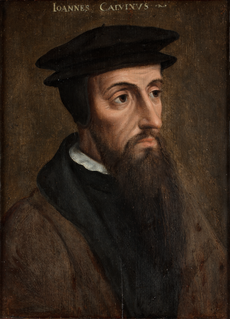 W
WTheodore Beza was a French Reformed Protestant theologian, reformer and scholar who played an important role in the Reformation. He was a disciple of John Calvin and lived most of his life in Geneva. Beza succeeded Calvin as a spiritual leader of the Republic of Geneva, which was originally founded by John Calvin himself.
 W
WFrançois Bonivard was a nobleman, ecclesiastic, historian, and Geneva patriot at the time of the Republic of Geneva. His life was the inspiration for Lord Byron's 1816 poem The Prisoner of Chillon. He was a partisan of the Protestant Reformation, and by most accounts was a libertine, despite his vocation.
 W
WJean-Jacques Burlamaqui was a Genevan legal and political theorist who popularised a number of ideas propounded by other thinkers.
 W
WJohn Calvin was a French theologian, pastor and reformer in Geneva during the Protestant Reformation. He was a principal figure in the development of the system of Christian theology later called Calvinism, aspects of which include the doctrines of predestination and of the absolute sovereignty of God in salvation of the human soul from death and eternal damnation, in which doctrines Calvin was influenced by and elaborated upon the Augustinian and other Christian traditions. Various Congregational, Reformed and Presbyterian churches, which look to Calvin as the chief expositor of their beliefs, have spread throughout the world.
 W
WMarie Dentière was a Walloon Protestant reformer and theologian, who moved to Geneva. She played an active role in Genevan religion and politics, in the closure of Geneva's convents, and preaching with such reformers as John Calvin and William Farel. In addition to her writings on the Reformation, Dentière's writings seem to be a defense and propagation of the female perspective in the rapidly changing world. Her second husband, Antoine Froment, was also active in the reformation.
 W
WGeorges-Louis Le Sage was a Genevan physicist and is most known for his theory of gravitation, for his invention of an electric telegraph and his anticipation of the kinetic theory of gases. Furthermore, he was a contributor to the Encyclopédie ou Dictionnaire raisonné des sciences, des arts et des métiers.
 W
WJean-Louis de Lolme or Delolme was a Genevan and British political theorist and writer on constitutional matters, born in the then independent Republic of Geneva. As an adult he moved to England, and became a British subject. His most famous work was Constitution de l'Angleterre, which was subsequently published in English as well. In it, de Lolme advocated a constitutional form of government enshrining the principle that monarchy, aristocracy and democracy should be balanced against each other. He also praised the element of representative democracy in the constitution, and urged an extension of suffrage. The work influenced many of the framers of the United States Constitution.
 W
WPaul Henri Mallet was a Genevan writer.
 W
WJane Marcet was an English salonnière of Swiss origin, and an innovative writer of popular, explanatory science books. She also broke new ground with Conversations on Political Economy (1816), which explains the ideas of Adam Smith, Malthus and David Ricardo.
 W
WAlbertine Adrienne Necker de Saussure was a Genevan and then Swiss writer and educationalist, and an early advocate of education for women.
 W
WAdolphe Pictet was a Swiss linguist, philologist and ethnologist.
 W
WJean Romilly was an 18th-century Genevan watchmaker, journalist and encyclopédiste.
 W
WJean-Jacques Rousseau was a Genevan philosopher, writer and composer. His political philosophy influenced the progress of the Enlightenment throughout Europe, as well as aspects of the French Revolution and the development of modern political, economic and educational thought.
 W
WAnne Louise Germaine de Staël-Holstein, commonly known as Madame de Staël, was a woman of letters and political theorist of Genevan origin who in her lifetime witnessed (1789–1815) at first-hand the French Revolution and the Napoleonic era up to the French Restoration. She was present at the Estates General of 1789 and at the 1789 Declaration of the Rights of Man and of the Citizen. Her intellectual collaboration with Benjamin Constant between 1794 and 1810 made them one of the most celebrated intellectual couples of their time. She discovered sooner than others the tyrannical character and designs of Napoleon. For many years she lived as an exile – firstly during the Reign of Terror and later due to personal persecution by Napoleon.
 W
WThéodore Tronchin was a Genevan physician.
 W
WFrançois Turrettini was a Genevan-Italian Reformed scholastic theologian.